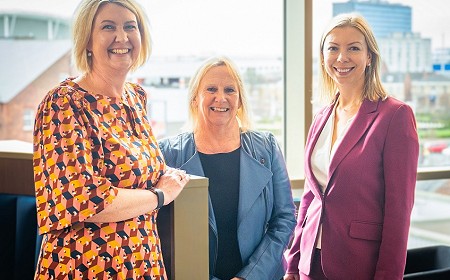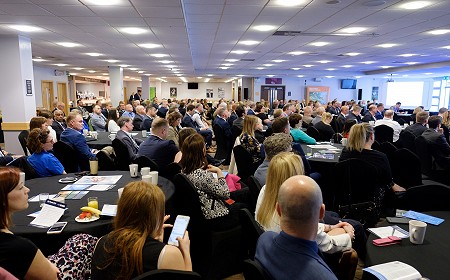
10.06.24
Waterman never giving up on passion for pop music
A household name from the world of entertainment highlighted the business principles driving his twin passions of pop music and railways as he spoke at the official launch of Humber Business Week 2024.
Pete Waterman, renowned for his work with people and projects including Rick Astley, Kylie Minogue and Pop Idol, told of the importance of adaptability, innovation and apprenticeships.
On training, Waterman noted the importance of universities but revealed that, having left school at 14 unable to read or write, he is one many people who had to find a different route.
“Training people on the job is the right way to do it. Some people are not clever enough for university – certainly I wasn’t but I am passionate about railways and we take on young people and they get jobs with us. If you give people a chance you find they are worth that chance and that’s why apprenticeships work.”
Astley had initially been hired as a Youth Opportunity Programme trainee on £40 a week, lived with Waterman in Crouch End, London and was given a lift to work every day.
Waterman revealed that one day, after they had been delayed by his over-long phone conversation with a girlfriend, Astley quipped: “You’re never gonna give her up”, and a hit song was born.
Waterman was working on the lyrics within seconds. It took 18 months for “Never Gonna Give You Up” to emerge as a record in July 1987. Produced by Waterman and collaborators Mike Stock and Matt Aitken, the song racked up an array of achievements including topping the charts in 25 countries and being named best single at the 1988 Brit Awards.
Waterman’s interest in music came from listening to American Forces Radio and Radio Luxembourg. Having grown up in 1950s Coventry he recognised there was no chance of getting a job with the London-centric BBC and wider music industry, but he amassed a record collection which brought demand to play at parties.
He formed the Floorboards Club, charging two shillings admission and two and sixpence for a bottle of Coca-Cola – five times his purchase price.
After accepting a job offer from the manager of the Locarno in Coventry he developed a talent for watching the audience for fights and for any signs that certain songs were clearing the dancefloor.
“If that happened I knew I would be out of a job if I played the same song again,” he said.
Waterman said the experience taught him the importance of knowing your market and understanding what the public wants, adding that the K-pop phenomenon caught the industry napping.
He said: “Music has changed. Streaming has completely changed the way we listen to music and unfortunately it’s taken away a lot of the charm. You want an interaction with the audience. Spotify’s impression is that nobody listens to a track for more than 4.5 seconds, although a good band will always get there.
“Everything is about subscriptions, they want you to sign up for long term purchases and it’s the same with video and TV. The only way for bands is to understand that people still want to buy something.
“You can’t buy a virtual pair of trousers. You want to put them on. People want to own product whether it’s a calendar, pillow case, pyjamas, a recording. That’s why people go to a Rolling Stones gig and come away with a t-shirt.
“Just because you have had a number one record doesn’t mean the next one is going to be number one. You have got to change all the time in the music industry like any other business. You get a finite time with your product and then you have to reinvent it. If you want to succeed you want something that’s different think different, think out of the box.”



